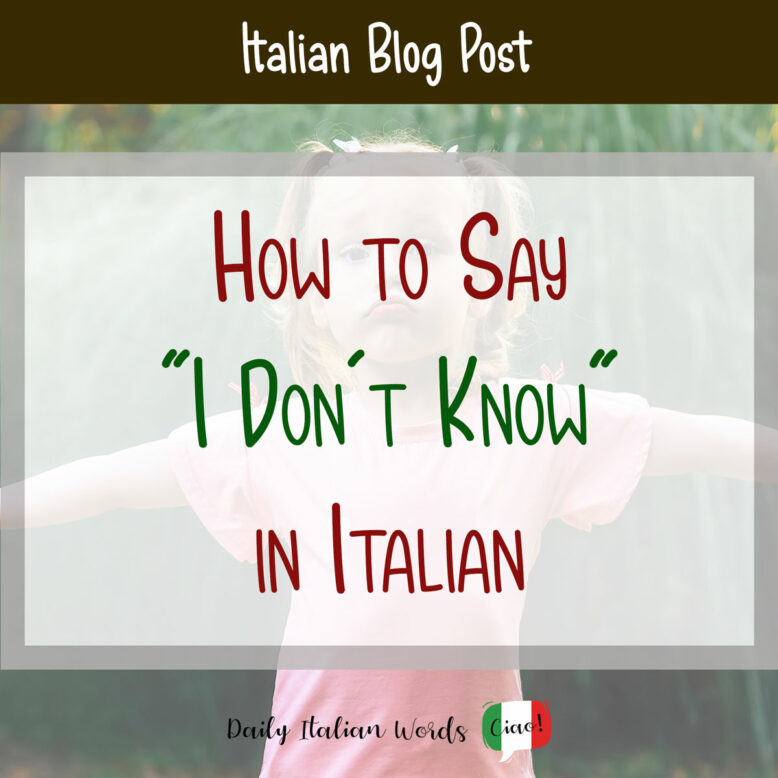Knowing how to say “I don’t know” in Italian is an essential skill for communicating because it can be a lifesaver in various situations. Whether you’re a tourist navigating the streets of Italy, a student engaging in conversation with native speakers, or a professional in an Italian-speaking environment, knowing how to candidly admit that you don’t know something is incredibly important.
Moreover, being able to say “I don’t know” isn’t just about acknowledging a gap in your understanding; it opens the door to further learning. It invites others to share their knowledge, helping you to expand your grasp of the Italian language and culture.

How to say “I don’t know” in Italian
There are 6 key expressions to say “I don’t know” in Italian. As you will see, some may appear quite similar, though each has its own subtle nuance. And if you can’t memorise them all, don’t worry – the last expression in this list is especially simple and very easy to remember.
Non so / Non lo so
(I don’t know)
Let’s start with the direct Italian translation of “I don’t know”. In Italian we say non so or non lo so. The difference between the two is that Non lo so includes lo, which acts as a placeholder for the specific thing you don’t know, making it more common in response to questions.
For instance:
If someone asks, Che film vuoi vedere al cinema sabato? (Which movie do you want to watch at the cinema on Saturday?), a typical reply could be, Non lo so, c’è troppa scelta! (I don’t know, there is too much choice). In this case, “lo” refers to the movie you can’t decide on.
On the other hand, if you say Non so che film voglio vedere al cinema sabato, c’è troppa scelta! (I don’t know which movie I want to see at the cinema on Saturday, there is too much choice!), you are already specifying what you’re uncertain about, so “lo” isn’t needed.
Both Non so and Non lo so are your go-to phrases for those “I have no clue” moments in Italian. They can be used in a wide range of contexts, fitting into both casual talks and more serious, formal chats. If you want to sound more polite, you can add mi dispiace (meaning “sorry”)’ at the end of them.
Here are a couple more examples:
Mi scusi, sa dirmi come posso arrivare in Piazza della Repubblica? – Non lo so, mi dispiace.
Excuse me, can you tell me how to get to Piazza della Repubblica? – I don’t know, sorry.
Non so se saremo in grado di soddisfare tutte le richieste dei clienti entro fine mese.
I don’t know if we’ll be able to meet all customer requests by the end of the month.
Non ne ho idea
(I have no idea)
Another common way to say “I don’t know” in Italian is by using the expression Non ne ho idea. This phrase is particularly useful when you’re asked about something specific. It’s more frequently used in informal situations to indicate that you lack information, an answer, or any clue about a specific topic or question.
Here are some examples:
Sai a che ora passa il prossimo treno? – Non ne ho idea, prova a chiedere in biglietteria.
Do you know when the next train is coming? – I have no idea, try asking at the ticket office.
Sai perché Mario è così arrabbiato oggi? – Non ne ho idea, forse ha litigato con Anna.
Do you know why Mario is so angry today? – I have no idea, maybe he had a fight with Anna.
Non ne ho la minima idea / Non ne ho la più pallida idea
I haven’t got the slightest idea
When you want to emphasise a complete lack of knowledge or awareness about something, the Italian phrases non ne ho la minima idea or non ne ho la più pallida idea are perfect choices.
Both these expressions are suitable for various situations, both informal and formal. They effectively convey that you are uncertain about a particular topic, don’t know the answer to a question, or can’t provide any help or insight on a specific issue.
Here are a couple of examples to illustrate their use:
Cos’è successo tra Anna e Paolo? Non si parlano da due giorni. – Onestamente, non ne ho la più pallida idea.
What happened between Anna and Paolo? They haven’t talked for two days. – Honestly, I haven’t the faintest idea.
Sai come si accende? – Non ne ho la minima idea.
Do you know how to turn this on? – I haven’t got a clue.
Che ne so!
How would I know!
Che ne so is a very relaxed Italian phrase commonly used to express uncertainty or a lack of knowledge about a topic. It is typically employed in casual conversations among friends and family, when responding to questions. It can also appear as Ma che ne so or E che ne so for added emphasis. For example:
Chi è quel ragazzo che parla con tua sorella? – Ma che ne so!
Who’s that guy talking to your sister? – How would I know!
Moreover, che ne so is sometimes used as a conversational filler in informal dialogues, adding an easygoing tone to the conversation. For instance:
Quindi, cosa facciamo questo sabato? – Che ne so, potremmo andare a mangiare una pizza.
So, what are we doing this Saturday? – I don’t know, maybe we could grab some pizza.
It’s also quite common to place the pronoun io (I) after che ne so for added emphasis, or to insert mild and strong expletives into the phrase (e.g. che cavolo ne so io = how on earth should I know).
Chi lo sa?!
Who knows?!
The expression Chi lo sa! is commonly used in Italian to express uncertainty in a casual way. For example:
Quando finirà questa pioggia? – Chi lo sa!
When will this rain end? – Who knows!
Here, it indicates that the end of the rain is unpredictable.
In informal contexts, you may also hear Chissà chi lo sa!, which is used for added emphasis. This translates to Who knows who knows it! in English, humorously accentuating the uncertainty or the unknowability of a situation. For instance:
Gianni, cosa mi hai preso per Natale? – Eh, chissà chi lo sa!
Gianni, what did you get me for Christmas? – Oh, who knows!
This is a playful response suggesting the speaker’s wish to keep things a bit mysterious.
Boh!
Dunno
When learning how to say I don’t know in Italian, boh is the most informal expression you will come across. Now, Italians do love to pair their words with expressive gestures, and boh is typically used with a shoulder shrug or by jutting out the chin and pulling down the lips, vividly expressing either a lack of knowledge or a sense of indifference.
Remember, boh is very casual and is best reserved for conversations with friends and family. Here are a couple of examples:
Che ore sono? – Boh, non ho l’orologio.
What time is it? – Dunno, I don’t have a watch.
Cosa regaliamo ad Enrica per il suo compleanno? – Boh, tu hai qualche idea?
What should we get Enrica for her birthday? – Dunno, do you have any ideas?

Heather Broster is a graduate with honours in linguistics from the University of Western Ontario. She is an aspiring polyglot, proficient in English and Italian, as well as Japanese, Welsh, and French to varying degrees of fluency. Originally from Toronto, Heather has resided in various countries, notably Italy for a period of six years. Her primary focus lies in the fields of language acquisition, education, and bilingual instruction.


